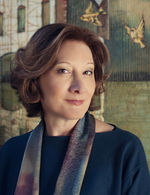Carol Strohecker
From Santa Fe Institute Events Wiki
| Complex Systems Summer School 2013 |
For more information about Carol Strohecker visit:
http://www.carolstrohecker.info
http://www.centerfordesigninnovation.org
Complexity studies are forming a framework for my understanding of organizational learning and growth, particularly in the contexts of interdisciplinary research and education, technology advancement, and community economic development.
My interest in the evolution and dynamics of complex systems stems from doctoral study and subsequent work with a co-founder of MIT's Artificial Intelligence Laboratory, Seymour Papert. Work in the milieu gave rise to StarLogo, NetLogo, LEGO Mindstorms, and other "thinking tools" for learning about distributed and networked systems. My own research has focused on "genetic epistemology" – that is, conceptual development – as it pertains to understandings of topology, spatial reasoning, and the creation of computationally supported learning environments. The resulting thinking tools have addressed diverse topics such as microbiology, neuroscience, urban design, social entrepreneurship, and collective meaning-making through systems for shared stories represented in textual and pictorial forms.
These interests have played out through a career trajectory characterized by participation in the formation of high-tech research entities: I was among the first graduate students in MIT's Media Laboratory, among the first research scientists in Mitsubishi Electric Research Labs, the first senior scientist in Media Lab Europe (MLE), and the inaugural director of the University of North Carolina's Center for Design Innovation (CDI).
The latter two roles took me beyond my work in generating computational systems, and beyond logistics of organizational start-up, to broader considerations of urban renewal and economic development: MLE was the core project of a revitalization effort in Dublin, Ireland, where technology research and development were situated within the reclamation of "disused" buildings in and around the historic Guinness Brewery. MLE was also part of a national economic development strategy, as Ireland established itself within the expanding European Union. CDI, likewise, is part of a movement beyond the manufacture of agricultural products to development of a knowledge-based economy.
Historically, the North Carolina region in which CDI is located has depended on conversions of wood to furniture, cotton to textiles, and tobacco to cigarettes. These manufacturing industries have diminished and moved offshore, resulting in huge job losses from which the residents are struggling to recover. Accompanying the mitigative strategy of technology research and development is the repurposing of warehouses and offices associated with the R.J. Reynolds Tobacco Company. The result is mixed development of a huge urban research park, in which CDI's future building is now being constructed and where more and more academic research labs, residences, corporate offices, and retail enterprises are appearing.
Collaboration with the architects, urban planners, and real estate developers is giving me an opportunity to take a lead role in formulating the landscape as a set of interconnected nodes. Partnering college and university campuses will reach through the hub of CDI into the biotech district where medical research translates for commercial viability. The emerging connections are physical as well as social, as we encourage collaborating students, faculty, and community members to move along varied pathways – for buses, automobiles, cyclists, and pedestrians – to attend seminars and participate in interdisciplinary projects.
This overview role is prompting my reconsideration of concepts of organizational learning, to question how they may maintain or transform at larger scales of collective human activity. For this purpose, through the Complex Systems Summer School, I hope to personally transpose and better understand issues of:
development (character, pace, and limits to growth);
scale (learning and development of individuals, organizations, cities, regions);
diversity, plurality, differentiation, and complementarity;
useful vs superfluous redundancy;
variation vs replication; and
kinds and degrees of connectedness.
I hope to work with colleagues at SFI in thus continuing to expand my repertoire of tools for thinking and action.

